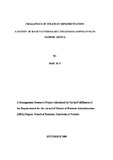| dc.description.abstract | Firms are dependent on their environments. They get their inputs from the environment,
transform the inputs into outputs and transfer the outputs into their environment.
Environments are dynamic and for firms to be successful in their environments, they need
to anticipate and adapt to changes in their environments. It is these changes that pose
challenges to firms. Firms respond to these challenges through formulation of appropriate
strategies. It is not enough for firms to formulate good strategies but these strategies must
be implemented effectively for the firm to achieve success.
The objective of this study was to determine the challenges of strategy implementation in
manufacturing multinationals in Nairobi-Kenya. The second objective of the study was to
determine the factors that affected effective strategy implementation in manufacturing
multinationals operating in Nairobi Kenya
The research design was a cross sectional survey that utilized a semi structured
questionnaire. The questionnaire contained both open ended and close ended questions.
Senior managers of the companies targeted were interviewed. Descriptive statistics were
used to analyze the primary data collected. Analysis was carried out through use of mean
scores, frequency tables and standard deviation.
Research findings confirmed that manufacturing multinationals faced various challenges
at varying degree. Human resources without requisite skills and competences were
identified as a major challenge. Uncontrollable factors in the external environment also
pose major challenge during the implementation. Other challenges included lack of
information and lack of adequate physical resources
In order to implement their strategies effectively, multinational companies need to ensure
they have a fit between the strategy staff and skills that necessary. Thus before attempting
implementation an assessment should be carried to determine whether there are gaps in
ix
skills and arrangement should be made to close those gaps through for example training
and development.
Research findings also confirmed that various factors affected effective strategy
implementation. These factors included performance targets, leadership of the Chief
Executive officer, financial resources, planning and control systems, proper coordination
and talented management team. | en |

